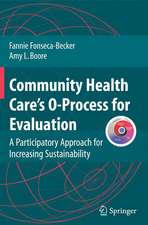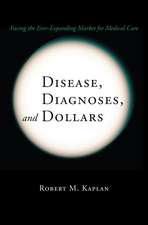Optimizing Health: Improving the Value of Healthcare Delivery
Editat de Franz Porzsolt, Robert M. Kaplanen Limba Engleză Hardback – 19 sep 2006
The first section of the book provides theoretical perspectives from economics and systems thinking that help us to focus on how one might determine the value of medical care for patients. The next section considers the ethical and philosophical dilemmas that face developed countries in distributing medical care. How is justice served and evidence-based medicine employed to increase the value of medical care for patients?
The section on psychology deals with measuring outcomes from the patient’s perspective and involving patients in medical decision making. Measuring quality of life and gaining valid quality of life information when patients cannot respond for themselves are important topics covered by these chapters. Other chapters consider ways that patients can become more involved in medical decision making with the expectation that this will increase the value of medical care for patients.
A major section of the book about clinical practice discusses problems that can reduce the value to patients of medical care. These include overdiagnosis, aggressive treatments that do not result in better patient outcomes, findings that earlier diagnosis does not always result in better outcomes, and the extent of medical error in treatment.
The final sections deal withcost-effectiveness analyses and applications of clinical epidemiology. The chapters include a number of original investigations and applications of new methodologies. All-in-all, the volume is must reading for practitioners, policy makers, and researchers who want to find in one place the state-of-the-art thinking and future directions of valuing medical care from the patient’s perspective.
| Toate formatele și edițiile | Preț | Express |
|---|---|---|
| Paperback (1) | 371.83 lei 6-8 săpt. | |
| Springer Us – 29 oct 2010 | 371.83 lei 6-8 săpt. | |
| Hardback (1) | 378.24 lei 6-8 săpt. | |
| Springer Us – 19 sep 2006 | 378.24 lei 6-8 săpt. |
Preț: 378.24 lei
Preț vechi: 398.15 lei
-5% Nou
Puncte Express: 567
Preț estimativ în valută:
72.39€ • 74.78$ • 60.24£
72.39€ • 74.78$ • 60.24£
Carte tipărită la comandă
Livrare economică 25 martie-08 aprilie
Preluare comenzi: 021 569.72.76
Specificații
ISBN-13: 9780387339207
ISBN-10: 0387339205
Pagini: 314
Ilustrații: XXII, 314 p.
Dimensiuni: 155 x 235 x 21 mm
Greutate: 0.65 kg
Ediția:2006
Editura: Springer Us
Colecția Springer
Locul publicării:New York, NY, United States
ISBN-10: 0387339205
Pagini: 314
Ilustrații: XXII, 314 p.
Dimensiuni: 155 x 235 x 21 mm
Greutate: 0.65 kg
Ediția:2006
Editura: Springer Us
Colecția Springer
Locul publicării:New York, NY, United States
Public țintă
Professional/practitionerCuprins
Framework of CLINECS.- “CLINECS”: Strategy and Tactics to Provide Evidence of the Usefulness of Health Care Services from the Patient's Perspective (Value for Patients).- Systems View of Health Care.- Ethics and Philosophy.- Seeking Justice in Health Care.- Evidence-Based Medicine and Ethics: Desired and Undesired Effects of Screening.- Paradoxes of Medical Progress: Abandoned Patients, Physicians, and Nurses.- Theory Behind the Bridge Principles.- Psychology.- How to Measure Quality of Life.- New Instrument to Describe Indicators of Well-Being in Old Old Patients with Severe Dementia: Vienna List.- Patient Empowerment: Increased Compliance or Total Transformation?.- Shared Decision Making in Medicine.- Clinical Practice.- Overdiagnosis and Pseudodisease: Too Much of a “Good Thing”?.- Palliative Medicine Today: Evidence and Culture.- Medical Geography–Who Gets the Goods? More May Not Be Better.- Cancer Survival in Europe and the United States.- Patient Safety: What Does It Mean in the United States?.- Increasing Safety by Implementing Optimized Team Interaction: Experience from the Aviation Industry.- Evidence-Based Information Technology: Concept for Rational Information Processing in the Health Care System.- Economically Oriented Analyses.- Cost-Effectiveness Analysis: Measuring the Value of Health Care Services.- Cost-Effectiveness of Lung Volume Reduction Surgery.- Health Economic Evaluation of Adjuvant Breast Cancer Treatment.- Aims and Value of Screening: Is Perceived Safety a Value for Which to Pay?.- Clinical Epidemiology.- Evidence-Based Health Care Seen From Four Points of View.- Efficacy, Effectiveness, and Efficiency of Diagnostic Technology.- Reduced Mammographic Screening May Explain Declines in Breast Carcinoma Among Older Women.- “Fading ofReported Effectiveness” Bias: Longitudinal Meta-Analysis of Randomized Controlled Trials.- Clinical Research and Outcomes Research: Common Criteria and Differences.- Are the Results of Randomized Trials Influenced by Preference Effects? Part I. Findings from a Systematic Review.- Are the Results of Randomized Trials Influenced by Preference Effects? Part II. Why Current Studies Often Fail to Answer this Question.- Conclusion and Outlook.- Suggested Changes in Practice, Research, and Systems: Clinical Economics Point of View.
Notă biografică
Franz Porzolt graduated from the University of Marburg School of Medicine and completed a postdoctoral fellowship on a grant from the Deutsche Forschungs-Gemeinschaft at the Princess-Margaret Hospital and Ontario Cancer Institute in Toronto. He received training in Internal Medicine, Hematology, and Medical Oncology at the Medical School of the University of Ulm, where he performed laboratory work and completed his doctoral thesis on "Natural Killer Cells." He established the Clinical Economics Group, which is involved in developing tools for assessing the (non- monetary) values of medical interventions from the patient's point of view. In 2000 he received a second appointment at the Ludwig-Maximilian University in Munich and a teaching contract with the Technical University in Munich to integrate Evidence-Based Medicine into the curriculum of medical students. He has worked with the Cochrane Collaboration, and currently has a contract to offer evidence based medicine training in the Alto Adige (Italy).
Robert M. Kaplan is Professor and Chair of the Department of Health Services and Professor of Medicine at UCLA. From 1997-2004, he was Professor and Chair of the Department of Family and Preventive Medicine at the University of California, San Diego. He is currently Chair-Elect of the Behavioral Science Council of the American Thoracic Society. Dr. Kaplan is the Editor- in-Chief of the Annals of Behavioral Medicine and Consulting Editor of four other academic journals. He is currently Co-Chairman of the Behavioral Committee for the NIH Women 's Health Initiative and a member of both the NHLBI Behavioral Medicine Task Force and the Institute of Medicine (IOM) National Academy of Sciences Committee on Health and Behavior. In addition, he is the Chairman of the Cost Effectiveness Committee for the NHLBI National Emphysema Treatment Trial (NETT).
Robert M. Kaplan is Professor and Chair of the Department of Health Services and Professor of Medicine at UCLA. From 1997-2004, he was Professor and Chair of the Department of Family and Preventive Medicine at the University of California, San Diego. He is currently Chair-Elect of the Behavioral Science Council of the American Thoracic Society. Dr. Kaplan is the Editor- in-Chief of the Annals of Behavioral Medicine and Consulting Editor of four other academic journals. He is currently Co-Chairman of the Behavioral Committee for the NIH Women 's Health Initiative and a member of both the NHLBI Behavioral Medicine Task Force and the Institute of Medicine (IOM) National Academy of Sciences Committee on Health and Behavior. In addition, he is the Chairman of the Cost Effectiveness Committee for the NHLBI National Emphysema Treatment Trial (NETT).
Textul de pe ultima copertă
Are our patients getting what they want for their health care money?
Should we change anything to give our patients more of what they want?
Do we even know what they want?
When service delivery, patient expectations, and the bottom line are in conflict, quality generally suffers. But such conflict can be minimized, say the editors of Optimizing Health.
Answering elusive questions on how quality emerges in medical care, Franz Porzsolt and Robert Kaplan synthesize findings from closely interrelated aspects of clinical practice, clinical epidemiology, health economics, psychology, and ethics. The resulting systems perspective of this timely book merges thinking from clinical medicine and economics to form the hybrid term "CLINECS". The book challenges readers to rethink the standard criteria for assessing benefit to patients, and shows how evidence-based medicine can be incorporated into actual public health settings, clarifying key medical goals regarding patient autonomy. An international panel of experts offers practical, workable guidelines for:
-Understanding the value of services from the patient’s point of view
-Involving patients in medical decision-making
-Avoiding overdiagnosis and overly aggressive treatment
-Reconciling outcomes research and clinical research
-Measuring patient quality of life—even for those who are cognitively impaired
-Improving efficacy and effectiveness throughout the system
Optimizing Health outlines an agenda of critical importance to health care professionals, researchers, and policymakers. This vision also makes it a bedrock graduate-level text for tomorrow’s clinicians andadministrators. This is material that will be studied, discussed, debated, but most of all, benefited from.
Should we change anything to give our patients more of what they want?
Do we even know what they want?
When service delivery, patient expectations, and the bottom line are in conflict, quality generally suffers. But such conflict can be minimized, say the editors of Optimizing Health.
Answering elusive questions on how quality emerges in medical care, Franz Porzsolt and Robert Kaplan synthesize findings from closely interrelated aspects of clinical practice, clinical epidemiology, health economics, psychology, and ethics. The resulting systems perspective of this timely book merges thinking from clinical medicine and economics to form the hybrid term "CLINECS". The book challenges readers to rethink the standard criteria for assessing benefit to patients, and shows how evidence-based medicine can be incorporated into actual public health settings, clarifying key medical goals regarding patient autonomy. An international panel of experts offers practical, workable guidelines for:
-Understanding the value of services from the patient’s point of view
-Involving patients in medical decision-making
-Avoiding overdiagnosis and overly aggressive treatment
-Reconciling outcomes research and clinical research
-Measuring patient quality of life—even for those who are cognitively impaired
-Improving efficacy and effectiveness throughout the system
Optimizing Health outlines an agenda of critical importance to health care professionals, researchers, and policymakers. This vision also makes it a bedrock graduate-level text for tomorrow’s clinicians andadministrators. This is material that will be studied, discussed, debated, but most of all, benefited from.
Caracteristici
Integrates the principles of Evidence Based Medicine into the delivery of health care service Editors are prestigious in the field, especially Robert Kaplan This book will be an extension of the work the editors have done in this field of Public Health Includes supplementary material: sn.pub/extras
















